Old Becoming New
In New York, we have the unique feature of a passageway of land and water stretching across the state - the Erie Canal National Heritage Corridor. The tourism industry is focused on the revitalization of these trail systems - and the Erie Canalway is garnering lots of attention.
The Erie Canal was not, of course, built with recreation in mind. If you are not up on its history, I encourage you to immerse yourself in an exploration of its beginnings, its heritage, and its impact on the communities which built up around it over the years. At the forefront of much discussion is how to take this narrow, shallow ribbon of waterway, complete with an intricate lock system, and re-purpose it into a destination for local communities and distant travelers alike. Either do that, or fill it in, some say.
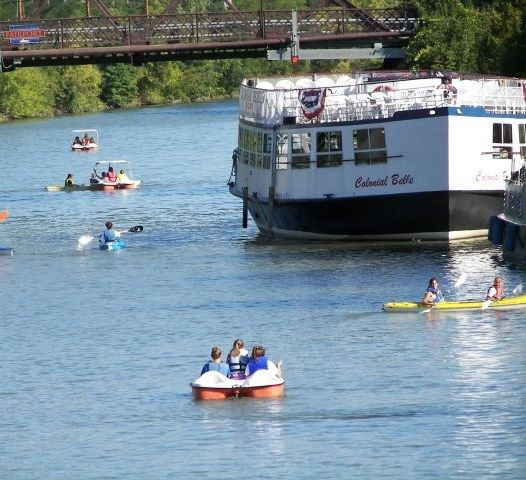
The Erie Canal is a growing center for recreation. Photo: Anita O'Brien
When I attended a global canals conference last year, I was excited to see the number of times "access" was used - "Creating Access to Our Canalway," "Tourism Access on the Canals," etc. I am, after all, immersed daily in the work of accessibility and inclusion of people with disabilities in recreation. I quickly realized this was the buzzword for the re-purposing discussions: The Erie Canal wasn't designed for access - by anyone. Rather it was supposed to give space for the mules to walk alongside the barges and pull them to their destinations. The architects certainly did not build "access" points for recreational activities! But now, that is exactly what we are talking about - driving business to the waterfront, putting in cafés, parks, walking/cycling paths, viewing points, museums, and wayfinding. The old Canalway is certainly destined to become a new Canalway!
The Next "Sliced Bread"?
While I had attended the canals conferece to talk about "access" as well, I propose that all of these developments should include the 20% of the population that has a disability. Recreation tourists with a disability are an untapped marketing niche and I can tell you that I know many people who are ready and willing to travel, to spend money, and to patronize businesses that can provide fun and fulfilling experiences!
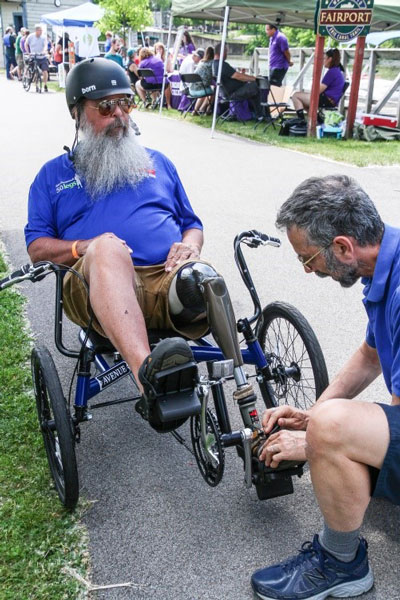
Guest gets adjustments made to his cycle before setting off down the Erie Canal. Photo: Leslie Schiff
A reality: People with disabilities often self-select out of participating in outdoor recreation activities because they assume (and rightly so in many cases) that a business does not have the knowledge and/or equipment needed to give them a satisfactory experience. And this makes sense! If I use a wheelchair, I have to know that your gym has some equipment that I can use in a seated position, that your rock climbing facility has adaptive harnesses to assist me while I climb, that your skydiving crew understands how to land with me after a jump. And in every business I might venture to, I want to know that you want me there - and if I look at your social media, your website, and your brochures and I don't see any pictures that vaguely resemble me as a person who uses a wheelchair or no language that tells me you are expecting people like me - guess what? I will keep looking!
A second reality: If I am the spouse of that person described above, and I'm looking for fun things for our family to do together, and I don't see pictures or read language that reflects that you can work with my entire family, then your business will be crossed off my list!
Rochester Accessible Adventures (RAA) formed in 2015 exactly because of these two realities. We know: a) people with disabilities and their families are not enjoying the positive health benefits (social, emotional, physical, and mental) of recreation opportunities in their communities, and b) recreation businesses are not equipped with the knowledge and resources to be able to open their doors to people with disabilities and their family and friends on a daily basis.
Our position is that all recreation businesses in any hometown community can become inclusive in their operations every day their doors are open! Rochester Accessible Adventures has created a model of inclusion training that provides recreation businesses the training and ongoing support they need to operate inclusively with confidence! It's truly the best thing since sliced bread!
Looking Outside [the Box] for Our Recreation
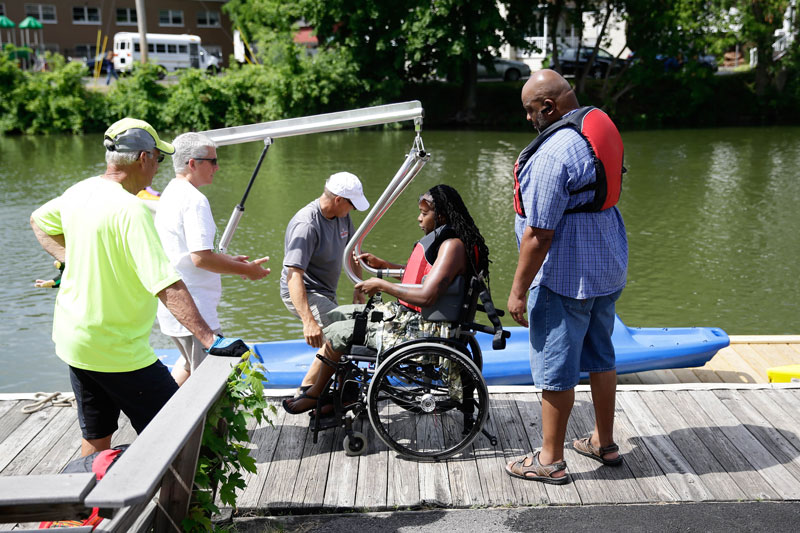
Dad and daughter prep for a kayak adventure at ECBC. Photo: Dario Castaldi
Erie Canal Boat Company (ECBC) in Fairport, NY was RAA's first Community Health Inclusion (CHI) initiative - a kayak and cycle rental for-profit business that now offers both standard and adaptive equipment whenever they are open. As a result of our work together, ECBC is likely to rent to a person with Multiple Sclerosis, or spinal cord injury, or cerebral palsy, or traumatic brain injury, or intellectual disability at least once each week - and more often than not, at least one family member or friend of that person will come along and rent, too! What an immense freedom it is to be able to decide what you want to do and to go do it with someone you want spend time with! This is my measure of what true inclusion is!
I could tell you so much about the amazingly positive impact this is having on our community! Two friends took their first bike ride together in 50 years of friendship. A dad had the choice to ride with his kids and spouse on Father's Day. A man who is legally blind is renting a kayak this week and making use of our volunteer CanalPal to enjoy the canal with him. A woman held her birthday party on the canal in kayaks with her friends because she could! This truly is what keeps me pushing towards this systemic level of change I want in our communities.
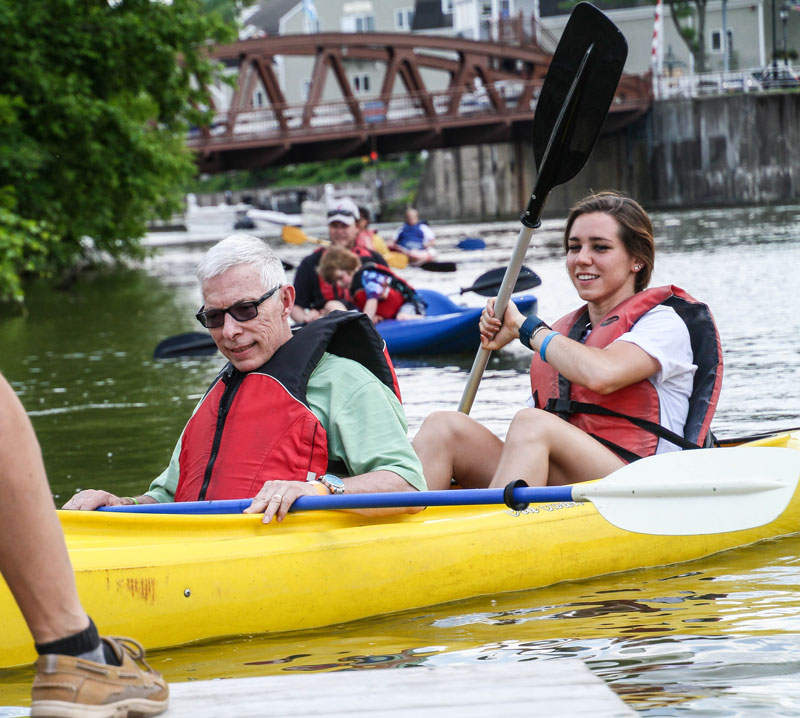
Guest utilizes a volunteer while kayaking. Photo: Leslie Schiff
Curious about the ROI? Is it worth it as a business to invest in the inclusion? ECBC saw a 31% increase in revenue during its first full season of operating inclusively - two-thirds of this was attributed to kayak and cycle rentals by people with disabilities and another third from family/friends/caretakers of the renters with disabilities. That many people self-selected in to kayaking and cycling! Wouldn't you?
Creating Destination Points
Creating destination points is our goal. Truly, every community's recreation industry should be operating inclusively. Period. That way, we have the choice to engage in active healthy recreation any day of the week, in and around our daily schedules. And when we travel, we want to have the same option, right? Fairport, NY is now a destination point for many more people simply because ECBC operates inclusively.
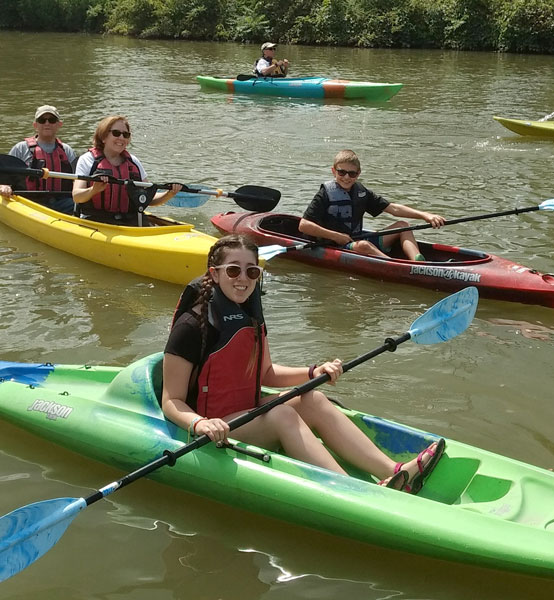
NYC family celebrates inclusion in outdoor recreation! Photo: Anita O'Brien
A family from New York City added the Rochester region to its vacation itinerary specifically because they learned Erie Canal Boat Company could accommodate the needs of each of its four members. They combined their day of paddling with an overnight stay and a visit to an area museum, continued to Niagara Falls (their original destination), and stopped back by ECBC for an afternoon of cycling and dinner on their journey back to NYC. A couple traveled 1.5 hours each way twice this past weekend (six total hours!) for our Open House Extravaganza so they could try out the adaptive equipment and meet people for whom inclusion was a natural thing (something not happening yet in their hometown).
We are set on taking our CHI model of inclusion across the state of New York (and beyond!)
Time to Explore!
I say it's time to explore the outdoors! What's in your neighborhood, your region, your state? What would you like to do? Let's figure out how to get those businesses started on the road to inclusion and let's make sure you consider exploring the outdoors in your next adventure!
About the Author
Anita O'Brien is a Certified Therapeutic Recreation Specialist (CTRS) with 22 years of experience in providing adaptive and inclusive recreation opportunities for individuals with disabilities. In 2015 Anita formed the non-profit organization Rochester Accessible Adventures (RAA) in direct response to the community's need for systemic change with results in sustainable inclusive recreation opportunities. Anita develops Community Health Inclusion (CHI) initiatives which transform community recreation businesses and municipalities to include people with disabilities whenever they are open.
Most of the stories here on LiveQuickie.com were submitted by readers. Do you have a story to tell? We'd love to hear it. Submit your story here.